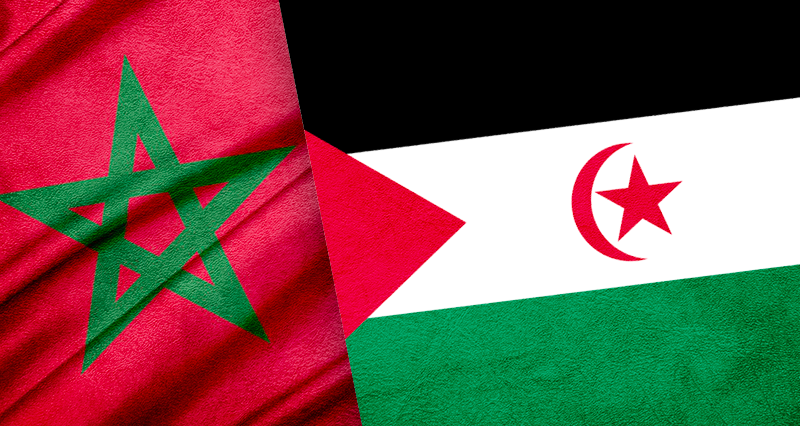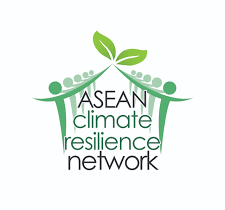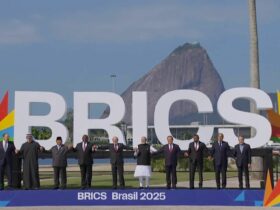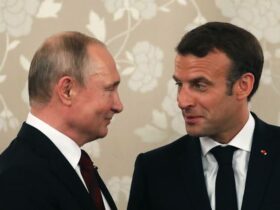By Prof. Dr. Belkacem Iratni (CNASPS member)
Introduction
This article is based on excerpts drawn from my two publications on the Western Sahara issue.[1]
The Western Sahara has been considered as Africa’s last colony and as the ″longest, most protracted conflict in the history of the United Nations″, to use the terms of former US State Secretary John Bolton.[2]
If the Western Sahara has been a ″forgotten″ or ″frozen″ dispute for over three decades,[3] it was brought back to light in the last two years, following violent skirmishes between the Polisario Front which fights for the right of the Saharawi people for self-determination and Morocco which claims historic rights over this territory.
This article is divided into three parts:
– The first part assesses the history of the Western Sahara marked by the existence of a people that was confronted to Moroccan irredentist claims and Spanish colonization.
– The second part deals with the process of the annexation of the Western Sahara by Morocco after Spain turned back to its mission to achieve the decolonization of this territory and its decision to relinquish it to Morocco (and Mauritania) through the 1975 Madrid Agreements.
– The third part delves into the faith of the Western Saharan in the light of the recent violent skirmishes between the Polisario Front and Moroccan forces bringing the dispute to the brink of a war between the two belligerents in 2021-2022. It will also ascertain the future prospects of the Western Sahara conflict in the light of the implications of the war between Russia and Ukraine as the Western Sahara may become one of the hottest contention issues of the extension of the looming new East- West cold war on Africa.
I – The historical foundations of the territoriality of the Western Sahara under Spanish colonialism and Moroccan irredentism
The Western Sahara is situated on the Atlantic shore of northwestern Africa and stretches over 260.000 sq. /km as shown on this political map:

The Western Sahara has an ancient history, but for the needs of this presentation, it may be sufficient to assert that until the 8th century, the Sanhadja, a Berber tribal confederation coming from North Africa, had inhabited this territory. The native population embraced Islam and came to speak mainly the Hassaniya language, an Arabic-based dialect, as a result of the Arab conquest which extended all over North Africa and to Spain.
Throughout its history, the Western Sahara had been crossed by traditional routes used by caravans formed out of Reguibat nomads and camels for the transport of salt and gold between North and West Africa.
The present-day populations of the Saharawi population are the descendants of tribes that came from Yemen during the 15th century and have succeeded in stabilizing the country, making Saguia Al Hamra a well renowned religious and educational center.
Like all North African countries, the Western Sahara was the object of the colonial scramble and its population resisted repeating incursions of the Western powers and Moroccan attempts of expansion.
In 1724, the Sultan Moulay Ismail of Morocco sent Black troops, the Abid al-Bukhari, to help the Emir of Trarza in the Western Sahara to attack the French post of Saint Joseph in Senegal.[4] These repeated incursions in the desert by Moroccan troops constituted the historical basis of Morocco’s claims over the Western Sahara territory.
The first stages of the Spanish protectorate over the Western Sahara were confronted with unrests carried out by local Saharawi tribes (Ouled Delim) in 1887, 1892 and 1894. Resistance against Spanish occupation of the Western Sahara began to emerge with the appeal for a holy war launched by a religious chief Ma- Al-Ainin in 1895 after he had succeeded in setting up a powerful Saharawi Ribat (urban and military center) in Smara, but the resistance of this tribal chief ended with the defeat of his troops in June 1910.
One of Ma-Al-Ainin’s sons, Ahmed al-Hiba, extended his power over the Western Sahara. However, Saharawi rebellions continued sporadically but tended to fade away as the French succeeded in beating the Reguibat tribes, notably in 1934.
In 1895, a treaty was signed between Moroccan and British authorities stipulating that ″no power will make claims on the territories extending from Oued Draa to Cape Bojador called Tarfaya…because these territories belong to Morocco.″[5] At the end of the 19th century, the southern part of Morocco was still a bilad al-siba (a dissent land) or a land which the Moroccan throne did not control.
This treaty was one of the documents Morocco displayed before the International court of Justice (ICJ) in 1975 in order to sustain its claims over these territories. However, the ICJ estimated that the British diplomatic correspondence of that time indicated that the region of Cape Juby did not belong to Morocco whose limits end at Oued Draa.
The ICJ stated that by signing this treaty, the British authorities had only admitted the pretentions the Moroccan Sultan could make over the southern parts and had not recognized Morocco’s sovereignty over these territories.
To the question submitted to the International Court of Justice by King Hassan II in 1975, ″was the territory really subject to no State (terra nullius) when the Spaniards colonized it and if not, what legal ties linked its inhabitants to those of Morocco and Mauritania?”, this Court found that, while there were indeed links between the Moroccan Sultan and the inhabitants of parts of the Western Sahara and similar ties with Mauritania, there were no ties of sovereignty. [6]
On June 27, 1900, France and Spain signed the Paris Treaty, which delimitated the frontier between Rio de Oro (then under Spanish domination) and Mauritania that was a French colony at that time. The Paris convention fixed the borders of Saguia Al Hamra and Cape Juby (southern Spanish Morocco) on October 4, 1904. [7]
The Spanish colonial authorities completed their control of the Western Sahara with the support of auxiliary forces, which were recruited among the nomads.
During the Second World War, Spanish authorities started to improve the social and economic conditions of the Western Sahara, at least for the benefits of Spanish settlers, fish and mining companies. Thus, they founded the Spanish Western Africa in 1947 which included Ifni, the Tarfaya band, Saguia-Al -Hamra and Rio de Oro.
Saharawi resistance to Spanish colonial grip was sporadic but never ceased, as highlighted by the rebellions that occurred in 1957 and 1958. Some movements to fight Spanish colonialism were created but did not last long and it was El Frente Popular de Liberacíon de Saguia-El-Hamra y Rio de Oro (Polisario) founded in 1973 by El-Ouali Mustapha Sayed, which militated for the independence of the Western Sahara from Spanish colonial rule.
The Western Sahara was also the subject of claims from Morocco on the basis of alleged historical links with this territory. Indeed, after it gained independence in 1956, Morocco attempted to complete the project of ″Greater Morocco″ following the design of Allal Al Fasi, the leader of the nationalist party, Istiqlal. He disclosed a map that claimed a geographic configuration enclosing the Western Sahara and Mauritania down to the Senegal River as well as large swathes of the Algerian territory.
There was no doubt that the discovery of large phosphate deposits earlier in 1947 and lately, in the 1960s explained the real motivations of Morocco. In parallel, the Saharawi nationalism came to consolidate against the pretentions of Morocco.
II – The process of annexing the Western Sahara by Morocco and the resilience of the Saharawi people
When the winds of decolonization were sweeping the world, the United Nations General Assembly adopted a resolution on December 17, 1967 through which it invited Spain to immediately take measures leading to the independence of Ifni and the Western Sahara and engage negotiations over the sovereignty problems posed by these two territories.
Until 1974, Morocco complied with these recommendations, being perhaps convinced that the outcome of the referendum would confirm its sovereignty over the Western Sahara.
However, when news of an eventual withdrawal of Spain (operation Swallow) was disclosed, King Hassan decided to take over this territory by launching the ″green march″ (350.000 participants and more than 25.000 soldiers) to the Western Sahara on October 31, 1974.
Morocco and Mauritania obtained from Spain a partition of this territory through the November 1975 Madrid Agreements during the agony of the Spanish President, Francisco Franco.[8]
An unavoidable question quickly springs to mind: how could Morocco accept to share the Western Sahara while it claims that this territory is, historically, an integrative part of the Moroccan Kingdom?
Mauritania withdrew from the part of the Western Sahara territory (Tiris Al Gharbia) in August 1979 following a peace treaty signed with the Polisario Front (Tiris-Al-Gharbia was annexed shortly after by Morocco).
In order to preserve ″the useful Sahara″ it has conquered, Morocco went on to build a 1,200 km sand and stone wall (so-called berm) of 2 or 3 meters height and heavily protected by barbed wire entanglements, landmines and sophisticated surveillance device.
Meanwhile, thousands of Saharawis refugees moved to live in remote desert camps situated about 180 km from the Algerian southwestern border, and being depending on foreign humanitarian aid.
Since Morocco’s takeover of the Western Sahara, the Polisario Front intensified its efforts, to alter this ″fait accompli″. In addition to military resistance, this front set up the Arab Saharawi Democratic Republic (SADR) in 1976 which became a full member of the Organization of the African Unity in 1976 and in the African Union in 1999 and a great number of States has recognized SADR and other countries still adhere to UN resolutions supporting the Saharawi cause.
Algeria supported the right of the Saharawi people for self-determination ever since the United Nations has recognized this right in early 1960s.
This approach reflected Algeria’s accordance with its sacrosanct ideological principle based on the commitment to achieve decolonization, given Algeria’s own experience as a past colony and its bitter struggle to regain its independence and national sovereignty.
To Algeria, the Western Sahara constitutes a problem between the Polisario Front and Morocco and depends on the United Nations to permit the Saharawis to exercise their right of self-determination.
Thus, Algeria came to provide a multifarious support to the fight of the Polisario Front to recover its country’s legitimate national right, as it did with many liberation movements that fought colonialism especially in Africa during the 1960s-70s.
The Polisario Front and Morocco accepted in August 1988 the ″Joint Settlement Proposal″, incepted by a top-level joint task set up by the UN and OAU. Therefore, the Polisario Front declared a truce unilaterally and King Hassan met a Saharawi delegation in Marrakech in January 1989.
Thisplan received the approval of the UN Security CouncilinJune 1990 and the UN dispatched a mission known as MINURSO to the Western Sahara in April 1991, tasked with monitoring a cease fire between the belligerent parties and organizing the long-stalled referendum on self- determination.
The referendum was due to be held no later than February 1992, but this process failed because of disagreements over the size of the voting population. However, the real reasons behind Morocco’s blockade of the countdown to the referendum, despite the provisional list of voters was finalized by MINURSO in 1999, was the uncertainty of the referendum outcome.
Despite initiatives made by United Nations’ Secretary General, Kofi Annan, the plans incepted by James Baker, the United Nations envoy to the Western Sahara in 2002 as well as various informal meeting regrouping Moroccan officials and Saharawi representatives have been held in the US city of Manhasset since 2007, no progress has been made to implement the right of the Saharawi people for self-determination.
To break up the stalemate over the Western Sahara, the Saharawi refugees and those living in parts occupied by Morocco continued their resistance, as highlighted by protests, riots, hunger strikes and clashes with the security forces in May 2005 and the revolt of young Saharawis at the Gdeim Izik camps in October 2010 in a sound protest against human rights abuses, unemployment and harsh living conditions.
This unrest was regarded as prelude to the so-called Arab Spring events and Noam Chomsky, the American radical scholar, argued that this Arab spring ″did not begin in Tunisia but in the Western Sahara″. [9]
III – Implications of the Ukraine-Russia war over the future of the Western Sahara conflict
The Western Sahara has constituted a dilemma for the United Nations since it has not been resolved during the cold war era, which witnessed the rise to political independence of a great bulk of the colonies all over the world and especially in Africa.
Unlike many former African colonies, the Western Sahara was not under the domination of powerful Western empires (Britain and France) and unlike former Lusitanian (Portuguese) Africa, it did not present an important stake in the East-West rivalry at that time and the result was that its decolonization process has not been completed.
All the members of the UN Security Council have adopted a more or less balanced attitude with regard the Western Sahara issue.
Algeria’s status may enhance because this country will be courted by Europe in terms of access to the stable energy sources of this country.
Algeria has also been praised by foreign powers for its abilities to preserve stability in North Africa in the face of the repercussions that may be induced by the civil war in Libya, the spread of radical Islam, terrorism and transnational crime (illegal migration, smuggling of arms and drugs trafficking) in the Sahel-Sahara region and the precarious political situation in Tunisia.
The Western Sahara may become a″ hot″ issue in the eventuality that Africa may turn to be one of the theaters of the new East/West cold war that is looming as possible consequences of the Ukraine-Russia war.
Ingredients for this possibility may already exist: renewed tensions, and even violent skirmishes between the Polisario Front and the Moroccan forces, occurred ever since November 2020 because of Morocco’s operations in the disputed border and abuses of human rights in the occupied Saharawi territory, according to the Polisario Front’s statements.
Morocco’s provocations led to tensions between Algeria and Morocco which escalated in 2021 as Algeria accused its neighbor of destabilization attempts and threats to its national security with Israel’s assistance, after Morocco’s recent establishment of diplomatic relations with this country.
Both Russia and China may adopt a more supportive attitude to the right of the Western Sahara people for self-determination (within UN/Security Council) and increase pressure on Morocco whose ″autonomy plan″ has received the support of Trump administration in December 2020 in exchange of Morocco’s acceptance to establish diplomatic relations with Israel.
The Head of the Spanish government also expressed its support to Morocco’s claims in April 2022 and, consequently, turned his back to Spain’s mission to achieve the decolonization of the Western Sahara.
It is noteworthy to mention, however, that his move was not backed up by the Spanish Parliament and that many Spanish civil associations, trade unions as well as public opinion have been in favor of the right of the Saharawi people for self-determination.
The United States may not risk ″taking a back seat in resolving the Western Sahara conflict″ as an American strategist has pointed out.[10]
If the Biden administration seems to hesitate with regard reversing the decision of President Trump to recognize Morocco’s claims over the Western Sahara, it remains, however not excluded that the US may come to consider other options than those exclusively linked to support Morocco’s ″autonomy plan″ in the Western Sahara.
US State Secretary’s declaration, after his visit to Rabat in late March 2022, stating that Morocco’s autonomy plan ″is one potential approach to satisfy the aspirations of the Western Sahara″, may be regarded as a significant nuance to an overt and crystal-clear American support to Morocco’s claims over this country.
The Polisario Front declared in 2021 an end to the UN-brokered cease-fire agreement and the return to armed struggle against Moroccan forces that had entered the Guerguerat coastal border point with Mauritania, an UN-patrolled buffer zone. Rabat sought to disperse unarmed Sahrawi protesters blocking the crossing point linking the Moroccan-occupied Western Sahara to Sub-Saharan Africa.
In reaction, the Polisario Front declared that the clash was no longer about protests but about a complete Moroccan withdrawal from the Western Sahara.
Conclusion
The Western Sahara enjoys a valuable strategic location as it links the western southern parts of the Maghreb region to the western sub-Saharan Africa and has a large coastline on the Atlantic Ocean. It is well endowed with natural resources: phosphates, iron-ore, huge fisheries potential, and probably hydrocarbons. Its population is quite tiny but has a large portion of dynamic and educated youth.
These assets would enhance the status of the Western Sahara in the light of the expected high increase of world’s demand on Africa’s raw materials, as a result of the Ukraine-Russian war.
In addition, the Western Sahara may reflect another case of a proxy war between world powers in the vein of a new East/West confrontation. It may also become a contention issue between progressive countries that stick to the respect of international legality, principles of justice, human freedom and dignity and those which remain attached to an old world system that appears more and more anachronistic with regard the ongoing rapid and radical international mutations.
An independent Western Sahara would reinforce stability, security and cooperation in the Maghreb and the Sahel-Sahara region.
[1]″The arduous quest of the Western Sahara people for Self-Determination: The complexities of unachieved decolonization″ in Redie Bereketeab (Ed): Self-determination and Secession in Africa, London and New York, Routledge, Francis Taylor Group, 2015 and ″ The Arab League and the Western Sahara conflict: The politics of a sheer neglect″, Africana Studia, No 29, First Semester, 2018, 10-114.
[2] Bolton, John, ″Resolving the Western Sahara Conflict″, Washington, DC: Congressional Defense and Foreign Policy Forum, 1998.
[3]Yahia H. Zoubir, ″Stalemate in Western Sahara: Ending International Legality,″ Middle East Policy, Vol. XIV, No 4, Winter 2007, 158-177.
[4] Pernell, C.R, Morocco, from Empire to Independence, Oxford :Oneworld, 2003, p105.
[5] http://fr. Wikipedia.org/wiki/histoire du Sahara Occidental, retrieved November 3, 2012.This website is a valuable source for general information and facts concerning the conflict of the Western Sahara. It does not, however, provide in-depth analysis of the historical events.
[6]International Court of Justice, consultative statement, October, 16, 1975 061-19751016-ADV-01-00-EN.pdf.
[7]Jensen,Erik, Western Sahara: Anatomy of a Stalemate, International Peace Academy, London: Lynne Reiner, 2005.
[8] King Hassan was in contact with Luis Carrero Blanco, the Spanish Prime Minister and José Solis Ruiz, the Secretary General of the Movement party in the final government of Franco. It was Solis Ruiz who went to Rabat on October 21, 1975 to discuss the terms of the agreement related to the partition of the Western Sahara between Morocco and Mauritania.
[9] Corbyn, Jeremy, Simanowitz, Stefan, A New Dawn? Western Sahara and the Arab Spring, New Internationalist, September,14, 2011, https://newint.org/features/web-exclusive/2011/09/14/western-sahara-independence-resistance.
[10]Thomas M. Hill: Ukraine War Puts New Focus on Conflict in Western Sahara, US Institute of Peace, https://www.usip.org/publications/2022/04/ukraine-war-puts-new-focus-conflict-western-sahara.

















Leave a Reply